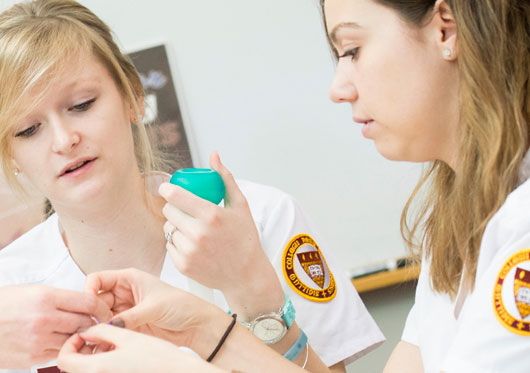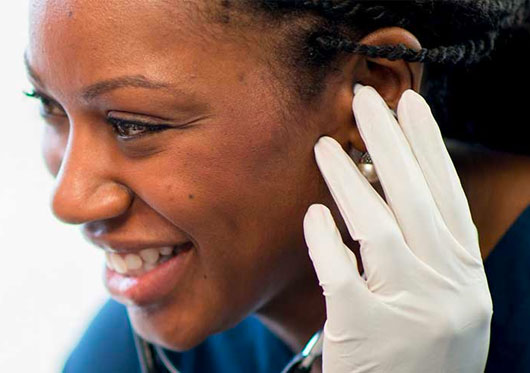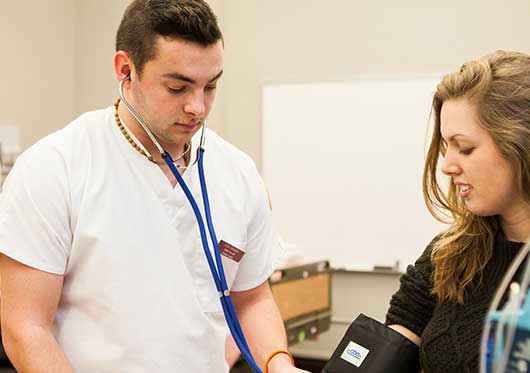How to Become a Nurse in Massachusetts
Regardless of the state you live in or the state you hope to practice in, nursing is a popular, rewarding career. In addition to providing steady employment opportunities and a relatively high salary, a career in nursing brings a special satisfaction that comes from making a real and lasting difference in the lives of patients.
The process of becoming a nurse, though, will vary from state to state—sometimes significantly. If you would like to become a nurse in Massachusetts, understanding the unique process involved will be an important piece of your success.
Below, we explore everything that you need to know about becoming a nurse in Massachusetts, including the career outlook and salary that you can expect, as well as the discrete steps involved in earning your license.
Table of Contents
- Steps to Becoming a Registered Nurse in Massachusetts
- Steps to Becoming a Nurse Practitioner in Massachusetts
- Pursuing Your Nursing Career In Massachusetts
Nursing Career Outlook in Massachusetts
Demand for nurses in Massachusetts is strong, and expected to remain promising in the coming decades. A survey conducted by the U.S. Department of Health and Human Services Health Resources and Services Administration (HRSA) indicates that Massachusetts is expected to see a shortfall of roughly 3,600 licensed practical nurses (LPNs) by the year 2030 compared to actual need. Similar shortages are expected for registered nurses (RNs), nurse practitioners (NPs), and other titles.
This increased demand can be seen reflected in average salaries for nurses in the Boston area, as noted by PayScale:
- Licensed Practical Nurse (LPN): $61,422 annually, or $29.53 per hour
- Registered Nurse (RN): $81,993 annually, or $39.42 per hour
- Nurse Practitioner (NP): $112,731 annually, or $54.20 per hour
This demand is driven by the fact that Massachusetts is home to a large number of highly-rated hospitals, each of which employs a vast number of nurses in a variety of specialties. Some of these notable organizations include:
- Massachusetts General Hospital
- UMass Memorial Medical Center
- Beth Israel Deaconess Medical Center
- Boston Children's Hospital
- Western Massachusetts Hospital
- Baystate Medical Center
- Brigham and Women’s Hospital
- Lahey Hospital and Medical Center
- Tufts Medical Center
- Newton-Wellesley Hospital
Steps to Becoming a Registered Nurse in Massachusetts
In order to practice as a registered nurse (RN) in the state of Massachusetts, you will need to earn a Massachusetts nursing license. This is because Massachusetts does not currently participate in the Nursing License Compact (NLC), which allows nurses from participating states to practice in any member state. That being said, legislation that would allow Massachusetts to join the compact is currently pending in the legislature.
In the meantime, if your goal is to become a nurse in the state of Massachusetts, you will need to follow the steps below to ultimately earn your license:
- Complete an accredited nursing program
- Pass the NCLEX Exam
- Apply for licensure
1. Complete an accredited nursing program.
To become a registered nurse in Massachusetts, you will first need to complete an accredited nursing program. While you may be able to become an RN by completing an associate’s degree in nursing, many hospitals will now only accept applicants who have completed at least their bachelor’s degree in nursing (BSN).
“Typically, a bachelor’s degree is the preferred level of education for entry into nursing in Massachusetts,” says Donna Glynn, PhD, RN, ANP, and Associate Dean of re-Licensure Nursing at Regis College. “And a bachelor’s degree is required to work as an RN in most Boston hospitals.”
If you are interested in becoming a nurse, there are many different degree options that you can pursue. At Regis College, for example, these include:
2. Pass the NCLEX Exam.
Upon graduation, registered nurse candidates will need to pass the National Council Licensure Examination for Registered Nurses (NCLEX-RN), which is designed to test your knowledge in critical content areas for nursing.
Registration for the exam will require you to:
- Submit an application for licensure in Massachusetts
- Meet all of the Massachusetts state requirements to sit for the NCLEX-RN
- Register and pay a $200 exam fee to sit for the NCLEX-RN
- Schedule your exam at the available time and testing site of your choosing
If you fail the NCLEX, you’re required to wait 45 days before you can try again.
3. Apply for a Massachusetts nursing license.
After you have graduated from an accredited nursing program and passed the NCLEX, you must submit your application for licensure through the state of Massachusetts. This can be completed online. There is a $230 application fee.
Additionally, you will need to be sure that you renew your license every two years (by your birthday) in order to maintain your ability to practice. The renewal fee is $120.
It Doesn’t Stop With Licensure
While becoming an RN is the end goal for some students, many others will work in the field for a number of years before ultimately deciding that they would like to advance further in their career by pursuing an advanced degree, which often leads to a position with greater authority and responsibility.
Often, this means earning a master’s degree in nursing (MSN) or a Doctor of Nursing Practice (DNP), both of which can offer you substantially increased career options and salary.
Steps to Becoming a Nurse Practitioner in Massachusetts
To become a nurse practitioner in the state of Massachusetts, you will need to pursue further education and licensure beyond your RN. After completing a master’s program, you will need to obtain APRN certification from a board-approved organization before applying for authorization to practice in Massachusetts.
If you’re looking to become a nurse practitioner in Massachusetts, the steps are as follows:
- Obtain a Massachusetts nursing license
- Pursue a graduate education
- Earn your national certification
- Apply for your APRN authorization
1. Obtain a Massachusetts nursing license.
Before you can become a nurse practitioner, you’ll first need to become a registered nurse licensed to practice in the state of Massachusetts. If you’ve never held an RN license either in Massachusetts or any other state, you will need to complete an accredited nursing program, pass the NCLEX exam, and apply for a Massachusetts nursing license.
Although it is possible to become a registered nurse with an associate’s degree, if your long-term goal is to become a nurse practitioner, you’ll want to pursue a bachelor’s degree in nursing (BSN). By obtaining your BSN, you’ll be able to sit for the NCLEX exam, apply for licensure, and become a registered nurse.
If you already hold a valid RN license in another state, you’ll have to apply for a Massachusetts license by reciprocity.
2. Pursue a graduate education.
To become a nurse practitioner in Massachusetts, you’ll need to complete a graduate degree program in nursing. Either a Master of Science in Nursing (MSN) or Doctor of Nursing Practice (DNP) can fulfill this requirement
The specific program that you will want to enroll in depends on your career goals and interests. A master’s degree in nursing is a great fit for nurses who want to specialize in a clinical setting, whereas a DNP program is an excellent option for nurses who might be interested in the non-clinical side of nursing and would like to prepare for potential leadership positions.
3. Earn your national certification.
As a nurse practitioner, you have the option to specialize in a particular area of medicine that best aligns with your personal goals.
To earn a certification, national certification agencies require nurses to meet certain education and clinical requirements. After meeting the requirements, nurses are eligible to sit for an exam administered by any of the national agencies recognized by the Massachusetts Board of Registration in Nursing.
It’s important that you consider the specialty that you would like to pursue prior to enrolling in a graduate program so that you will have met the certification requirements after completing your degree. Regis College offers five specialty tracks for nurse practitioners: adult-gerontology, pediatric, psychiatric-mental health, women’s health, and family medicine.
Upon completion of your coursework for the specialty of your choice, you’ll be eligible to sit for a certification examination.
4. Apply for your Massachusetts APRN authorization.
After completing your graduate education and passing your certification exam, you can apply for licensure in the state of Massachusetts. To do so, you’ll need to submit an application to the Board of Registration in Nursing, including:
- A copy of your valid Massachusetts RN license
- Official transcripts from your graduate institution
- A copy of your national certification
- Any supporting documentation needed regarding Good Moral Character
- An authorization fee
The Board will then review your application and issue your license to practice as an advanced practice registered nurse (APRN). Be sure to renew both your APRN authorization and RN license every two years.
Pursuing Your Nursing Career In Massachusetts
Whether you’re looking to become a registered nurse or a nurse practitioner, it’s crucial that you pursue an education at an accredited institution in order to gain the skills necessary for a successful nursing career.
Regis College’s undergraduate and graduate nursing programs comply with the educational requirements mandated by the Massachusetts Board of Registration in Nursing. On a national level, the Young School of Nursing was one of 26 nursing programs in the country to receive the Center of Excellence designation by the National League for Nursing.









